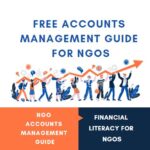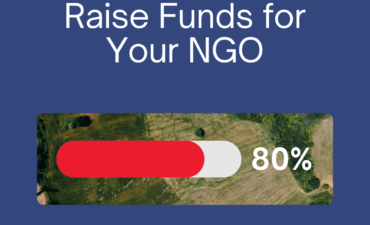Introduction: Free Accounts Management Guide for NGOs, Effective accounts management is a cornerstone of success for non-governmental organizations (NGOs) striving to make a positive impact on the world. This Free Accounts Management Guide for NGOs is designed to empower organizations with the essential knowledge and tools needed to navigate the complexities of financial management. As NGOs operate in dynamic environments, the importance of sound financial practices cannot be overstated.
In this guide, we will explore the crucial role that accounts management plays in the sustainability and credibility of NGOs, addressing common challenges faced in financial management and providing practical insights to overcome them.
By delving into fundamental accounting principles, financial statements, budgeting strategies, and incorporating free resources and tools, this guide aims to equip NGOs with the necessary skills to strengthen their financial foundations. As we embark on this journey, let us recognize the significance of transparent and accountable accounts management in propelling NGOs towards their mission-driven goals.
To begin with we need to understand the Importance of Accounts Management for NGOs (Free Accounts Management Guide for NGOs)
Effective accounts management is crucial for NGOs as it ensures financial stability, transparency, and accountability. Properly managed accounts enhance the organization’s credibility, enabling it to attract donors, partners, and stakeholders. This, in turn, facilitates sustainable growth and the successful execution of the NGO’s mission.
Now let’s take a closer look at challenges faced by NGOs in Managing Accounts (Free Accounts Management Guide for NGOs)
NGOs encounter various challenges in managing accounts, including complex funding structures, diverse revenue sources, and the need for compliance with stringent regulations. Limited resources, inadequate financial training, and the potential for fraud further compound these challenges. Addressing these issues is essential to maintain financial integrity and fulfill the organization’s social objectives.
What is the Purpose of the Free Accounts Management Guide? (Free Accounts Management Guide for NGOs)
The Free Accounts Management Guide serves to empower NGOs by providing concise insights and practical tools for effective financial management. It aims to enhance understanding of key financial principles, offering actionable guidance on budgeting, transparency, and internal controls.
Additionally, the guide highlights freely available resources, such as accounting software and templates, enabling NGOs to implement robust financial management systems without financial strain. By addressing common challenges, the guide supports NGOs in maintaining financial integrity, fostering sustainability, and successfully achieving their mission-driven goals.
Now, let’s understand what the Different Types of NGO Accounts are (Free Accounts Management Guide for NGOs)
There are in general three types of accounts
General Operating Account:
- Covers daily operational expenses of the NGO.
- Manages routine costs such as salaries, utilities, and administrative overhead.
- Provides flexibility for ongoing activities and organizational needs.
Project-Specific Accounts:
- Allocates funds for specific initiatives or projects.
- Helps track income and expenses related to individual projects separately.
- Facilitates accurate project budgeting and financial monitoring.
Restricted Funds Accounts:
- Ensures compliance with donor stipulations and restrictions.
- Designates funds for specific purposes as per donor agreements.
- Enhances transparency by demonstrating adherence to donor intentions and guidelines.
What are the Basic Accounting Principles those NGOs must know (Free Accounts Management Guide for NGOs)
| A. Accrual vs. Cash Accounting:
|
· Accrual Accounting: Records income and expenses when they are earned or incurred, not when the money is received or paid.
· Cash Accounting: Tracks transactions based on actual cash inflows and outflows. |
| B. Double-Entry Accounting System:
|
· Requires every financial transaction to have equal and opposite entries, maintaining the balance in the accounting equation (Assets = Liabilities + Equity).
· Enhances accuracy and completeness in financial records. |
| C. Importance of Accurate Record-Keeping:
|
· Ensures the reliability of financial information for decision-making.
· · Facilitates compliance with legal and regulatory requirements. · Supports transparency and accountability by providing a clear financial trail. |
Time to Learn about Essential Financial Statements That NGO uses on a regular basis (Free Accounts Management Guide for NGOs)
| Income Statement:
|
1. Revenue Sources:
· Identifies and categorizes all sources of income, including donations, grants, and earned revenue. · Provides a comprehensive overview of funds received during a specific period. 2. Expenses: · Lists all costs and expenditures incurred by the NGO. · Helps assess the financial health by comparing total revenue to total expenses. |
| B. Balance Sheet:
|
1. Assets:
· Presents a snapshot of the NGO’s resources and holdings. · Includes both tangible assets (property, equipment) and intangible assets (intellectual property, goodwill). 2. Liabilities: · Represents the NGO’s outstanding obligations and debts. · Includes loans, accounts payable, and any other financial obligations. 3. Net Assets: · Calculated as the difference between assets and liabilities. · Indicates the NGO’s overall financial position.
|
| C. Cash Flow Statement:
|
1. Cash Inflows:
· Tracks the sources of cash entering the organization, such as donations, grants, and investment income.
2. Cash Outflows: · Records the uses of cash, including operational expenses, debt repayments, and investments. · Assists in evaluating the organization’s liquidity and ability to meet financial obligations.Top of Form
|
Finally, nailing the Budget is an important aspect of financial journey for NGOs (Free Accounts Management Guide for NGOs)
AND, hence it is imperative for NGOs to prepare an annual budget for clarity of funds allocation under important expense heads.
Now financial planning can be segregate under two parts first revenue projections and second Expense Planning.
- Revenue Projections:
- Conduct a thorough analysis of historical financial data, considering trends and patterns in revenue sources.
- Collaborate with fundraising teams to estimate potential donations, grants, and other funding streams.
- Factor in any anticipated changes in funding from existing donors or potential new partnerships.
- Account for any special campaigns, events, or fundraising initiatives planned for the year.
- Expense Planning:
- Review past expenditures and assess the success of previous programs to inform future budget allocations.
- Collaborate with program managers and department heads to identify and quantify anticipated costs for each area of operation.
- Consider potential increases in costs, such as inflation or changes in market conditions, when planning for expenses.
- Allocate resources strategically, prioritizing initiatives that align with the NGO’s mission and goals.
- Build in a contingency fund to address unforeseen expenses or emergencies.
- Ensure transparency and accountability by involving key stakeholders in the budgeting process and seeking their input.
Nailing the annual budget requires a comprehensive and collaborative approach. By incorporating historical data, involving relevant stakeholders, and planning for various scenarios, NGOs can develop a robust budget that serves as a dynamic financial tool for effective decision-making and organizational success.
In a nutshell, mastering accounts management is a pivotal journey for NGOs, and this guide aims to be your compass in navigating the intricate financial landscape. By delving into essential accounting principles, financial statements, and budgeting strategies, we empower NGOs to build a solid foundation for sustained impact.
The guide’s focus on transparency, accountability, and the prudent use of resources underscores our commitment to supporting organizations in their noble missions. As you embark on this financial journey, may these insights and tools propel your NGO towards greater financial resilience, ensuring that your impactful work continues to make a positive difference in the world.
Related Good Reads, Link
Hey, STEAL our Best Premium Content For Absolutely Free, Check Out the Links below
HOPE these will add value to your existing skills and knowledge
Our information bears no cost (it’s absolutely FREE), don’t let valuable information slip away.
Join our community of avid readers who are always in the know. Subscribe to our website; stay connected and engaged with the latest news, trends, and developments by subscribing today.
(PUSH the bell ICON)
Leverage the power of knowledge to propel your organization to new heights. Don’t miss out to explore our content
- Latest Funds for NGOs,
- NGO Jobs
- Resources (Helpful Guides and Courses)
- Premium Resources
- NGO related articles
Empowering Humanity through Funds, Resources and Collective Action
Sharing is Appreciated









